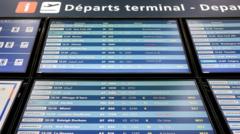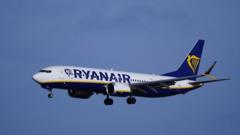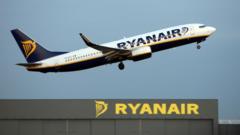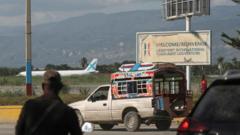A significant disruption in air travel has unfolded as a French air traffic control strike leads to extensive cancellations, impacting both holidaymakers and airlines across Europe.
**Ryanair Faces Major Disruptions as French Air Traffic Control Strike Grounds Flights for Thousands**

**Ryanair Faces Major Disruptions as French Air Traffic Control Strike Grounds Flights for Thousands**
Ryanair cancels over 170 flights affecting 30,000 passengers due to French air traffic control strike.
The French air traffic controller strike has had a devastating impact, leading to the cancellation of 170 flights and disrupting travel plans for more than 30,000 passengers. The strike, instigated by two French unions over concerns regarding working conditions, has resulted in a staggering 25% of flights being grounded at Paris airports and 50% at Nice airport.
Ryanair, the budget airline hardest hit, has expressed deep frustration over the incident, with Chief Executive Michael O'Leary criticizing the strikes for unfairly impacting European holidaymakers. He emphasizes that the strike's implications stretch far beyond flights directly to and from France, affecting airspace soaring over the country aimed at destinations like the UK, Ireland, Spain, and Greece.
French Transport Minister Philippe Tabarot condemned the timing and nature of the strikes as unacceptable, imploring unions to reconsider their decisions given the peak holiday season. The unions, UNSA-ICNA, protested against staffing shortages and management decisions, including the controversial introduction of a clock-in system for controllers, leading to failed negotiations with the civil aviation authority, DGAC.
In the wake of this disruption, Airlines for Europe (A4E) labeled the strike “intolerable,” emphasizing potential severe disruptions during a critical summer travel period. EasyJet has echoed sentiments of disappointment while urging for a swift resolution.
In a broader context, Ryanair also reported a significant operational impact due to ongoing conflicts in the Middle East, having previously canceled over 800 flights in June alone. Even with the turmoil, the airline managed to maintain over 109,000 flights that month, illustrating resilience amid the disruptions affecting less than 1% of its overall operations.
As travel disruptions continue to unfold, Ryanair and other airlines are left reassessing strategies to mitigate impacts caused by domestic industrial actions within French airspace.
Ryanair, the budget airline hardest hit, has expressed deep frustration over the incident, with Chief Executive Michael O'Leary criticizing the strikes for unfairly impacting European holidaymakers. He emphasizes that the strike's implications stretch far beyond flights directly to and from France, affecting airspace soaring over the country aimed at destinations like the UK, Ireland, Spain, and Greece.
French Transport Minister Philippe Tabarot condemned the timing and nature of the strikes as unacceptable, imploring unions to reconsider their decisions given the peak holiday season. The unions, UNSA-ICNA, protested against staffing shortages and management decisions, including the controversial introduction of a clock-in system for controllers, leading to failed negotiations with the civil aviation authority, DGAC.
In the wake of this disruption, Airlines for Europe (A4E) labeled the strike “intolerable,” emphasizing potential severe disruptions during a critical summer travel period. EasyJet has echoed sentiments of disappointment while urging for a swift resolution.
In a broader context, Ryanair also reported a significant operational impact due to ongoing conflicts in the Middle East, having previously canceled over 800 flights in June alone. Even with the turmoil, the airline managed to maintain over 109,000 flights that month, illustrating resilience amid the disruptions affecting less than 1% of its overall operations.
As travel disruptions continue to unfold, Ryanair and other airlines are left reassessing strategies to mitigate impacts caused by domestic industrial actions within French airspace.






















